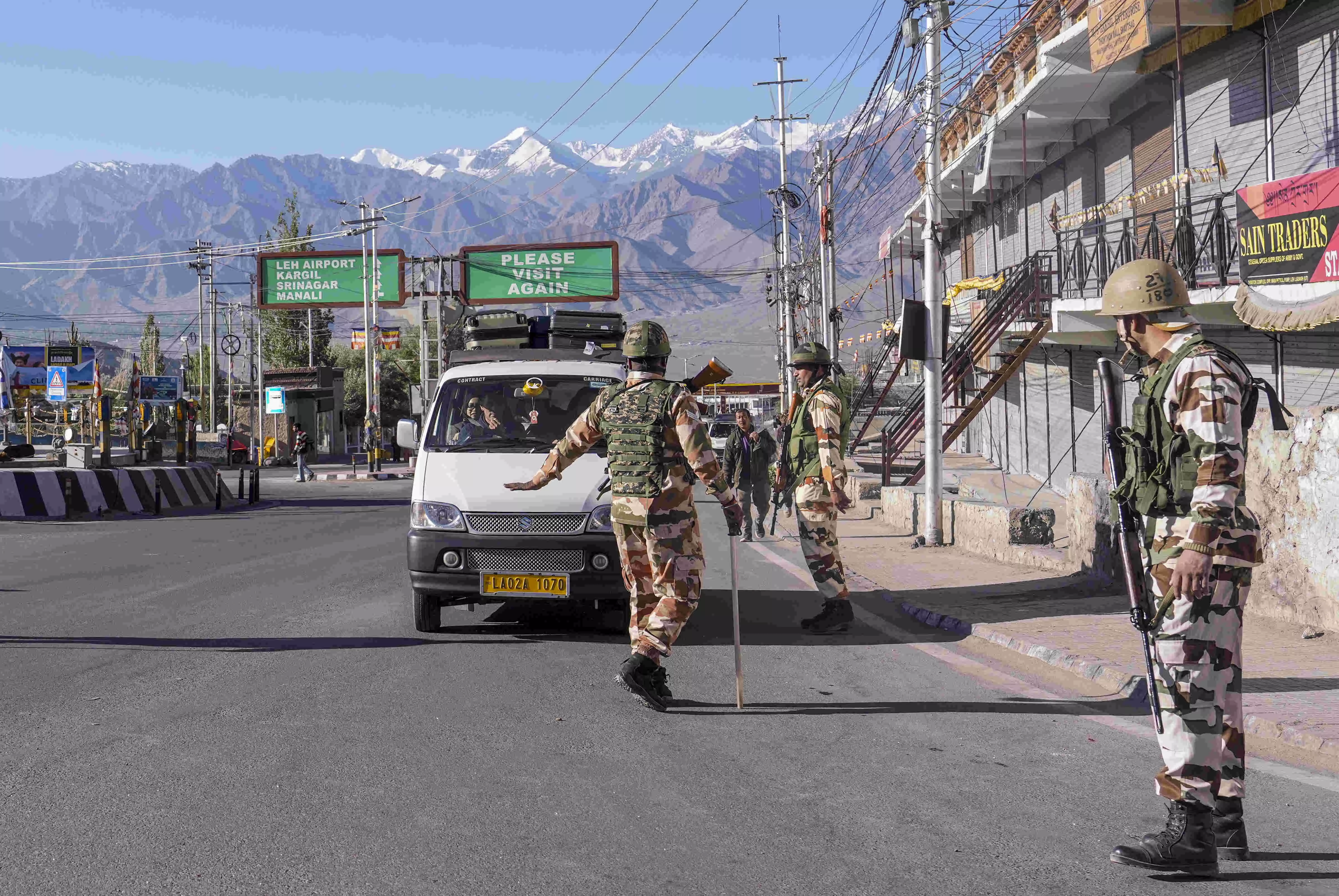
LEH, Sept. 27 -- Relaxations in curfew were allowed for the first time in a phased manner on Saturday in violence-hit Leh town of Ladakh for the first time since curfew was imposed three days ago. Residents heaved a sigh of relief and lined up outside shops selling essential commodities.
Police and paramilitary forces intensified patrolling and checking since early morning to maintain law and order following the detention of climate activist Sonam Wangchuk under the National Security Act (NSA) the previous day, officials said, adding no untoward incident was reported from anywhere during the relaxation period.
The Director General of Police, Ladakh, S D Singh Jamwal, said that curfew was relaxed for a total of four hours.
"We have taken a decision (to ease restrictions). The curfew is relaxed for two hours from 1 PM to 3 PM in the first phase in old city areas, followed by a two-hour relaxation in new areas from 3.30 pm to 5.30 PM," he told reporters.
The curfew was clamped in the town on Wednesday evening after widespread violence resulted in the death of four persons and injuries to 90 others during a shutdown called by the Leh Apex Body (LAB) to advance talks with the Centre on the demands for statehood and extension of the Sixth Schedule to Ladakh.
Lt Governor Kavinder Gupta chaired a high-level security review meeting at Raj Bhavan, after which the restrictions were eased.
Officials said police parties on Saturday announced the relaxation in the curfew using the public address systems and, soon after, shops selling essential commodities were opened, witnessing a heavy rush.
People were also seen queuing outside ATM kiosks in good numbers as the police and CRPF personnel kept a vigil, they said, adding the relaxation period passed off peacefully in the old city areas.
In a statement issued late Friday night, the Lt Governor-led administration justified the detention of Wangchuk, saying a series of alleged provocative speeches by him, with references to the Nepal agitation and the Arab Spring, resulted in Wednesday's violence that left four persons dead and scores of others injured.
It said the detention of Wangchuk was "important to restore normalcy" in the peace-loving Leh town and also to prevent him from further acting in a manner "prejudicial to maintenance of public order".
More than 50 persons were detained following the clashes, while strict restrictions under prohibitory orders banning assembly of five or more persons also remained in force in other major towns of the Union Territory, including Kargil.
Ladakh Congress, on the other hand, asserted that Wangchuk has become the most visible and vocal face of Ladakh agitation and no amount of "vilification campaign and trumped-up charges" against him would hold true in the eyes of the local population.
It said the government is terribly mistaken if it believes arresting Wangchuk would help restore peace and harmony in the region.
Other opposition parties too criticised his detention.
"The one who is working for our forces has been dubbed anti-national and arrested under the NSA and you are playing cricket with Pakistan which spreads terror in India. What kind of patriotism is this?" Shiv Sena (UBT) chief Uddhav Thackeray said.
In a statement, the Politburo of the CPI(M) said Wangchuk's detention under the "draconian NSA exposes the authoritarian character of the BJP-led central government" and demanded his release.
The Directorate of Information & Public Relations (DIPR), Ladakh, in a statement late Friday night, said: "Time and again it has been observed that Wangchuk has been indulging in activities prejudicial to the security of the state and detrimental to maintenance of peace and public order and services essential to the community."
It said that despite clear communication from the government regarding the meeting of the High-Powered Committee (HPC) and the offer of prior meetings before the HPC, Wangchuk, with his "ulterior motive", continued his hunger strike in the town from September 10.
"His series of provocative speeches, references to Nepal agitations, Arab Spring, etc, and misleading videos resulted in the violent protests of 24 September in Leh, where institutions, buildings and vehicles were burnt down, and, in the aftermath, police personnel were attacked, leading to the unfortunate death of four individuals.
The statement said it was important to restore normalcy in the peace-loving Leh town of Ladakh.
It said the administration, based on specific inputs, took a considered decision to detain Wangchuk under the NSA and move him to Jodhpur prison in Rajasthan.
Ladakh police chief described Wangchuk as the key person behind Wednesday's violence.
"What has been found in the investigation (against Wangchuk) cannot be disclosed at this moment. The process is going on and if you look at his profile and history, it is all available on YouTube. His speech worked as instigation as he talked about the Arab spring and the recent unrest in Nepal, Bangladesh, and Sri Lanka.
"He had his own agenda. There is a probe of foreign funding, violation of FCRA against him,'' he said. The police chief also cited some of Wangchuk's foreign visits, and termed them as suspicious.
"He attended an event by The Dawn in Pakistan and also visited Bangladesh," Jamwal told reporters here. Wangchuk has been the main face of the agitation spearheaded by the Leh Apex Body and Kargil Democratic Alliance for statehood and extension of sixth schedule to the Union Territory.
Jamwal said Wangchuk tried to hijack the platform and tried to scupper the dialogue between the Centre and Ladakh representatives.
The Centre has invited the leaders for a fresh round of talks on October 6. Jamwal said Wangchuk continued his hunger strike, despite knowing that an informal meeting between the two sides was going to take place on September 25. "Just a day before the informal meeting, a deliberate attempt was made to vitiate the peaceful atmosphere through provocative videos and statements which culminated with violence on Wednesday and unfortunate deaths," he said.
Published by HT Digital Content Services with permission from Millennium Post.
